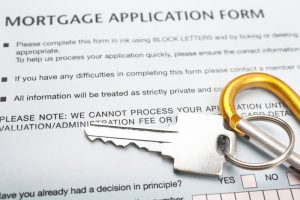 What is mortgage application fraud?
What is mortgage application fraud?
Firstly, it’s a crime that can lead to fines or imprisonment, depending on the severity of the fraud.
Essentially, mortgage application fraud is committed when a false claim is made in an application to obtain funds from a lender. It doesn’t matter how small an error, if you lie on a mortgage application, you have committed mortgage fraud.
Research by Cifas, the UK’s leading fraud prevention service, shows that fraudulent mortgage applications rose 5% in the first half of 2019 over the second half of 2018 and that 45% of the fraudulent applications were from people aged between 31 and 40.
What do mortgage lenders consider when looking for fraudulent applications?
When you are buying a property, many issues can lead a lender to look further into a mortgage application to check for fraud.
Identification
You must be able to prove your identity, both to your lender and your solicitor. It may be possible to check this electronically, or you may need to provide evidence such as your passport or photo (or valid old-style) driving licence. Do ask your solicitor or lender what evidence they require.
You will not be able to get a mortgage if you are not registered on the electoral register, so make sure you are registered before you complete your application.
Employment
Giving false information about your employment is fraud. For example, exaggerating the length of time you have worked for an employer or saying your work is permanent if it is only temporary or you are on a fixed-term contract.
Income
Lenders need to be sure that you can afford repayments on the mortgage you are applying for, so will check your bank accounts and payslips. Lying about income accounts for about 25% of mortgage fraud and can mean that your application is delayed or denied. Some people exaggerate their income, say by rounding it up, which, even if it is only a small amount, can still cause a hold up in the mortgage process. There are also those who ‘stage’ their income. Staging is where regular payments are made into the applicant’s account during the period which covers that checked by the lender. Often the amount is said to be salary from the applicant’s employee, or sometimes it is claimed that it is from a second employment. The payments usually stop after completion. Cifas’ research showed that 13% of adults in Great Britain think it is reasonable to exaggerate their income on a mortgage application.
Not disclosing your full financial situation, such as other loans, store cards or credit cards is also fraudulent.
Deposit
Lenders (and solicitors, who are legally obliged to ensure that money laundering has not been committed) will want to know where your deposit has come from. If you are using money you have saved yourself, or have inherited, lenders will usually accept this, but they make ask for evidence, so do keep all the information you have to prove where the money came from and where it has been kept.
However, if you have been given money from someone else for your deposit, this may flag the lender to some unusual activity and a money laundering investigation may commence. Many people are given money for a deposit by their parents or grandparents, so if you have received this sort of help, do ensure that you explain this to your lender, and your solicitor, or tell them exactly where your deposit has come from and keep evidence. You may also need evidence to prove that the money was given to you as a gift and not as a loan. A signed letter from the person who gave you the money should suffice. Ask your mortgage advisor or lender exactly what you will need for this purpose.
Don’t plan on paying your deposit using a credit card as, typically, mortgage lenders will not accept them as they are classed as unsecured loans. They are also high risk, particularly as credit card fraud accounts for 39% of all identity fraud cases in the UK.
Links with ex-partners
If you have taken out loans or credit cards with another person, such as your partner, you will have become financially linked with that person. Even if you have split up from them, if you have not disassociated from them financially, their current financial activity is likely to have an impact on your application for any credit, such as in a mortgage application; your application may be delayed or refused if their activity causes concern. Do contact credit reference agencies and ask to be disassociated from any ex-partners if you can.
Use of the property
Do make sure that you are honest about how you are going to use the property. If you say that it will be your home and you are applying for a home mortgage rate (on which interest rates are lower), but you are actually going to let it out, (buy-to-let mortgage rates are higher) – that is mortgage fraud. Lenders will need to satisfy themselves that you are buying the property for your home if that is what you tell them.
Value and price to be paid for the property
Knowingly giving an overvalue, or undervalue for the property you are buying, or misrepresenting the amount you are paying for it is mortgage fraud, as is not declaring any payments made or received directly between the buyer and the seller.
Why do people commit mortgage fraud?
The current economic situation has led to many lenders reducing the range of mortgages available, and whilst interest rates are low, some have tightened their borrowing criteria, making it more difficult to get a mortgage. Whilst this does not offer an excuse, it can lead to people making false claims in order to secure a mortgage that would not otherwise be approved.
Mortgage lenders carry out rigorous checks when assessing an application. This can mean it takes longer than you might expect to receive your mortgage offer. You might also encounter more questions than you are expecting. Don’t worry, in the long run, this could be to your advantage as the lender is ensuring that you can actually afford the mortgage payments and checking on the property itself, and, as long as you have completed your application honestly, there is no reason you should not expect your loan to be approved in time for you to go ahead with your new home purchase.
If you are purchasing a new home or remortgaging on your existing property, contact our property experts now. We can help you to ensure that your transaction runs smoothly every step of the way. If you are purchasing or remortgaging, you can get a no-obligation quotation for our work by clicking here. We can arrange a meeting to discuss your transaction, which at present, will be held virtually via telephone, email or video call. You can find out more about buying a house on our web pages.
Author: Caroline Murray, partner and head of our property team.

